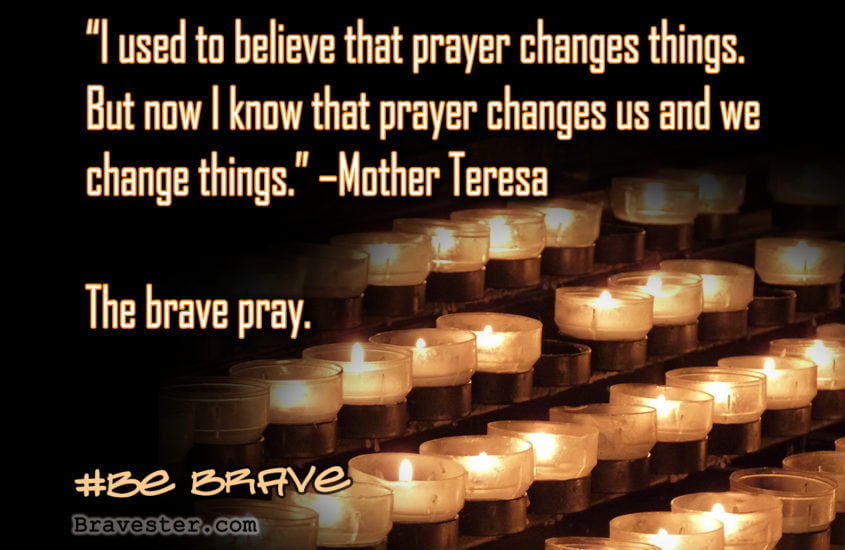Wisdom from Judaism, Catholicism, Protestantism, and Science All Teaching Us that Prayer Changes Us

Why do we pray safe prayers to God?
Because we don’t want to appear bossy to God. Because prayer too often becomes a wish list. Because we don’t want to sound selfish with our lists. Because we are trying to change God’s mind? Or we are not trying to change God’s mind?
And the biggest reason may be we don’t want to be disappointed by God. So we pray our low expectations.
Prayer is vulnerable. As George Bailey said, “That’s what I get for praying.”
I can justify those low expectations because at least I’m not asking God for a personal jet.
Then there is the big trailing thought of do my prayers do any good when God already knows what he is doing? I could then reason that God doesn’t even need my prayers. I do trust his sovereignty over my life and I trust that God will provide and lead accordingly. So why does God even need my prayers when I am doing my best to walk out my trust in that sovereignty?
We had this conversation about safe prayers in our church. (We weekly have such conversations.) We initially vulnerably struggled with the question because shame was speaking exposing our selfishness and low expectations. This was flipped when one of my people mentioned this quote from a book she is reading about Judaism.
“Asking God for things is not the main purpose of Jewish prayer. A commonly held view in Judaism is that we pray…to change ourselves–not because God needs our prayers, but because WE do… It’s designed to wake us up–to show us how far we’ve wandered from the Divine and to help us return… It does so by connecting us more deeply to others and to ourselves; helping us cultivate gratitude, awe, and humility; and spurring us to take action.
“Jewish prayer…seems designed to bring us into each other’s presence. Much of our liturgy is written in the ‘we’ rather than the ‘I’ voice, and there are certain prayers we’re not supposed to say by ourselves… Judaism wants us to be seen and supported in our grief, anxiety, and elation. And it wants us to witness and share in the struggles and celebrations of others, adding our ‘amens’ to their mourning and healing prayer, and blessing their life cycle ceremonies with our presence.” Here All Along: Finding Meaning, Spirituality, and a Deeper Connection to Life–in Judaism (After Finally Choosing to Look There), Sarah Hurwitz
(Did you notice how we need our people with our prayers?!)
Which then reminded me of this Mother Teresa quote that I love and use: “I used to believe that prayer changes things. But now I know that prayer changes us and we change things.”
That’s a Jewish view and a Catholic view stating that prayer changes us so we can be more connected here in our lives.
Hmmmm…maybe us Protestants have prayer wrong or at least too simple. Or maybe shame lies to us so we misunderstand prayer. More likely it is the shame.
Prayer is one of those spiritual formation practices. Prayer is encouraged throughout scripture and in teaching to be a regular practice in our lives, whether in the morning or evening and/or all day long. Prayer is encouraged to be conversational because we are having conversations with God. Prayer is to include times of silence so we can hear God’s response back to us. Prayer can include music, books, nature, walking. There is definitely not a definitive box around prayer.
You do prayer. But have you ever asked how can prayer change you?
How has prayer connected you more deeply to others and to yourself; helped you cultivate gratitude, awe, and humility; and spurred you to take action here in your real life?
My husband John remembers being challenged when he was a young Christian to pray for someone you hate daily for at least two months. He knew immediately who he was being challenged to pray for—his brother. He took up the challenge. To his surprise over that two-month time span he grew to have compassion for his brother. (There is an obvious story here not being told.) This compassion also gave John greater wisdom to place boundaries with his brother–which thusly increased his compassion. No longer was he up at night planning the demise of his brother. John actually slept better.
This practice of prayer did change John. Especially as a young Christian. John grew to believe early in his faith that God was for him to change his heart so much. This has formed him over these 25+ years.
Inspired by John’s story another friend shared that he treats prayer like he does forgiveness. Forgiveness is more often the blessed release for the forgiver than it is for the one who was forgiven. Same with prayer. Praying to God with his list changes him, makes him that better person.
When I pray for my list of others in my life I am connecting with them every time I pray for them. It is good for me to stay connected to them. Prayer gives me that way to stay connected to them and that changes me. I am reminded every time I pray for them why I love them so and why they are important to me. Do my prayers change God’s mind about the events of their lives? I hope so. I hope God is intervening on their behalf. I believe God is intervening on their behalf because of my prayers. I’m desperate for God to intervene on their behalves.
Then there is the increasing brain science that is finding out that prayer actually does change the brain. The brain changing would then change us, right?
Read: Prayer Changes Me–Literally Physically Changes Me (On a Brain Scan)
This is a new finding.
From findings from Dr. Andrew Newberg who specializes in the field of nuclear medical brain imaging: “With spiritual practices, the more you do it, the more you do it. That is, the more people can be encouraged to prayer, to engage their church and the people in it, to do charitable work, the more these concepts become a part of how your brain functions. With ongoing practice, you can do these things more easily and you want to do them more. You become ‘wired’ for it. Whether meditation, prayer, reading the Bible, discussing the Bible, or Bible studies, they change your brain, making you more receptive.
“Positive perspectives about God are good for the brain. However, negative perspectives about God can be detrimental, causing stress, anxiety, and can cause depression and negative emotions.” https://www.christianitytoday.com/pastors/2014/summer/faith-and-brain.html
Here together we have wisdom from Judaism, Catholicism, Protestantism, and science all teaching us that prayer changes us. Hmmmmm…maybe I can shut down that shame voice telling me how selfish my prayers are.





